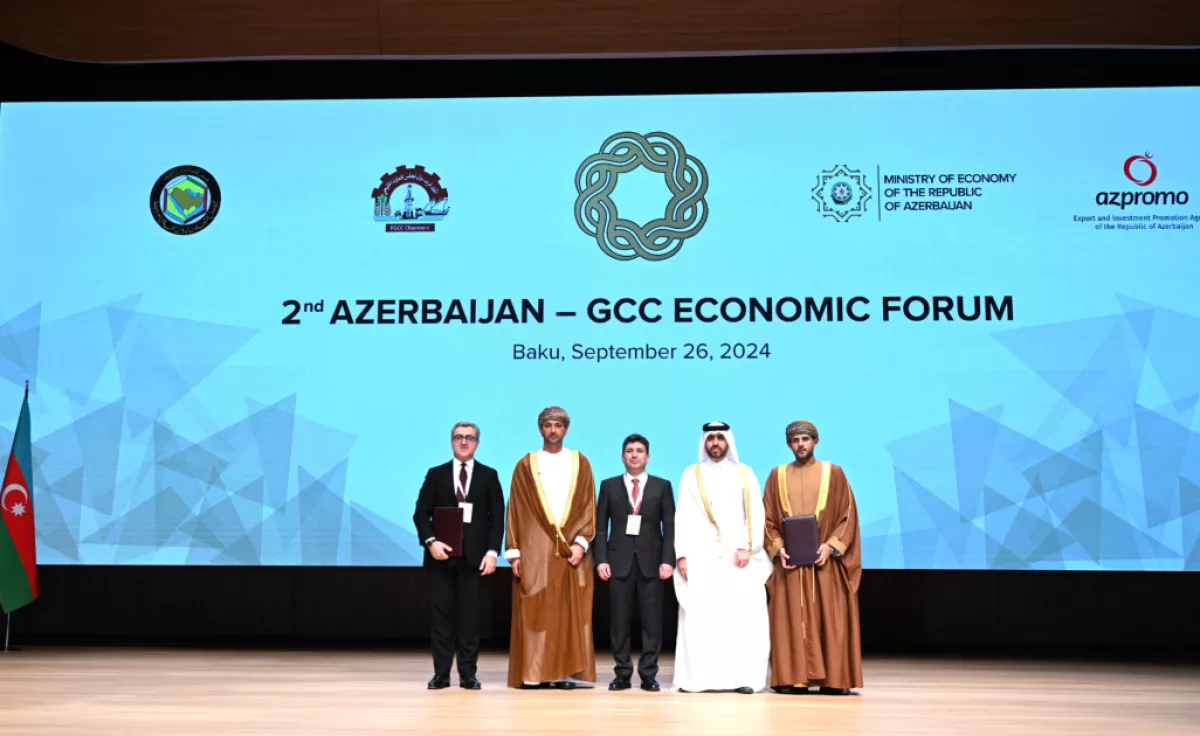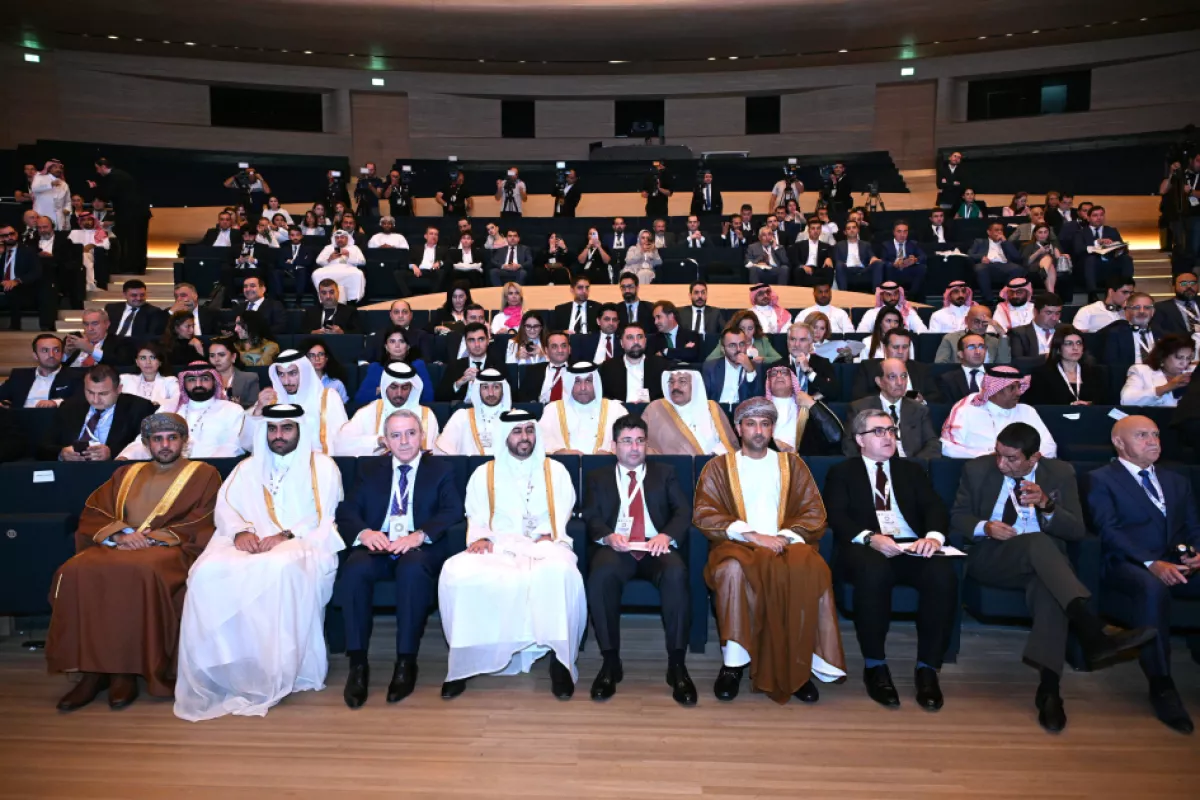Bridging business: Azerbaijan’s growing partnership with Persian Gulf Investment opportunities bloom
In recent years, Azerbaijan has recognized the Persian Gulf region as a vital area for enhancing trade and economic cooperation. The most active partnerships are developing with the United Arab Emirates (UAE), Saudi Arabia, and Qatar, focusing on sectors such as trade, green energy, tourism, and investment. To facilitate these connections, Azerbaijan has established trade houses in the Gulf and organized trade missions, allowing domestic businesses to participate in specialized exhibitions.
The recent 2nd Azerbaijan-Gulf Cooperation Council (GCC) Economic Forum,” held in Baku and organized by the Azerbaijan Export and Investment Promotion Agency (AZPROMO), marked another significant step toward strengthening business ties with the Gulf countries.
Over the past seven years, significant efforts have been made through the Ministry of Economy and its agencies—AZPROMO and the Small and Medium Business Development Agency of Azerbaijan (KOBIA)—to diversify the country's agrarian and industrial exports. This trade diversification strategy includes organizing various presentations and seminars, facilitating involvement of domestic companies and SMEs in international exhibitions, and promoting products under the "Made in Azerbaijan" brand.
In addition to establishing around ten trade and wine houses in China and Eastern Europe, Azerbaijan is increasingly focusing on several Arab states in the Persian Gulf. Recent initiatives have not only expanded exports of petrochemical products but also highlighted non-ferrous metallurgy and a range of goods produced in industrial parks. Key products include textiles, carpets, and silk items, with a particular emphasis on promoting Azerbaijani food products.
In recent years, there has been a strong push to market domestic organic honey, tea, dried fruits, sweets, narsharab, lavender oil, olive oil, as well as juices and canned fruits and vegetables in retail chains across the UAE, Saudi Arabia, Oman, Bahrain, Qatar, and other countries in the region. These efforts aim to enhance Azerbaijan's presence in the Gulf market and showcase the quality of its agricultural products.
All these ongoing efforts over the past seven years have significantly positively impacted Azerbaijan's trade dynamics with the Gulf monarchies. This was highlighted in the statistics presented during the recent second Azerbaijan-GCC Economic Forum held in Baku.
According to AZPROMO Executive Director Yusif Abdullayev, “At the first economic forum with the GCC countries in 2017, trade turnover was $69.5 million. By the end of 2023, this figure had increased 2.5 times to reach $175 million.” He emphasized that the trade potential between Azerbaijan and the Gulf states has not yet been fully realized, and the current forum presents an opportunity to explore growth prospects further.

Deputy Economy Minister Anar Akhundov, who attended the forum, echoed this sentiment, noting the positive trends: “From January to August 2024, Azerbaijan doubled its exports to the Persian Gulf countries, with overall trade turnover increasing by 28 per cent compared to the same period last year.”
The forum attracted around 400 representatives from both Azerbaijan and the Gulf countries, spanning various sectors of the economy. In addition to expanding trade relations, discussions focused on tourism development, cooperation on renewable energy sources (RES), and joint projects in water management and other areas. Opportunities in the transport and logistics sectors were also explored.
Deputy Minister Anar Akhundov noted that significant progress in tourism ties between Azerbaijan and the Persian Gulf countries has been observed in recent years. “The development of Azerbaijan’s tourism infrastructure, an increase in direct flights, the simplification of visa procedures, and the transition to a visa-free regime for some countries have all contributed to strengthening tourist traffic. In particular, the number of tourists arriving in Azerbaijan from several Gulf countries has increased by over 50 per cent.”
This positive trend has continued into the first seven months of this year. According to the State Statistical Committee, the number of visitors from the Persian Gulf countries reached 258,800, marking a 39.6 per cent increase.
A key aspect that sets Azerbaijan's business ties with the Persian Gulf region apart is the substantial investment portfolio: according to AZPROMO, direct investments from Gulf states in Azerbaijan's economy currently total around $4 billion. At the forum, Mohammed bin Hassan Al Malki, Undersecretary of the Ministry of Commerce and Industry of Qatar, highlighted that the potential for partnership and mutual investment between the GCC countries and Azerbaijan spans various sectors, including carbon energy and renewable energy sources.
Notably, Saudi Arabia has been a partner of Azerbaijan since the 1990s, particularly as part of the oil consortium involved in the “Contract of the Century” signed in 1994. In the 2000s, Saudi and Kuwaiti investment funds financed several initiatives aimed at modernizing Azerbaijan's road and water infrastructure. More recently, since 2022, Saudi Arabia's ACWA Power and the UAE's Masdar have emerged as key investors in Azerbaijan's green energy projects, contributing to the development of solar and wind power plants.
Additionally, discussions are ongoing with Nebras Power, a Qatari company specializing in gas turbine and wind power projects, indicating further opportunities for collaboration in the energy sector.
Cooperation with investors from the Persian Gulf countries in the renewable energy sector (RES) is expected to develop incrementally, eventually encompassing wind energy projects in the Caspian Sea and the production of green hydrogen.
“During the UN climate conference scheduled for November in Baku, there will be dedicated panels for businesses, which are expected to significantly contribute to the global fight against climate change. Companies from the Gulf countries are invited to participate in COP29 events,” Yusif Abdullayev, executive director of AZPROMO, stated.

Another promising area for attracting Gulf businesses is the capitalization of initiatives in the Alat Free Economic Zone, as well as in various industrial parks and districts. Companies from the Gulf region are also showing interest in projects in areas that have recently been liberated from occupation, with negotiations already underway with some firms.
According to Deputy Minister Anar Akhundov, international projects in the transport and logistics sector—particularly those focused on enhancing the potential of the Middle Corridor, expanding the Baku International Sea Trade Port, and developing the Baku-Tbilisi-Kars railroad—are opening new avenues for business cooperation with the Persian Gulf countries.
A significant outcome of the second Azerbaijan-GCC Economic Forum held in Baku was the signing of a memorandum of understanding on cooperation with the Federation of Chambers of the Gulf Cooperation Council. This agreement aims to enhance economic relations and foster mutual investment opportunities. It also outlines plans for organizing trade missions, economic forums, and specialized exhibitions to promote collaboration between Azerbaijan and the Gulf Cooperation Council (GCC) countries.








